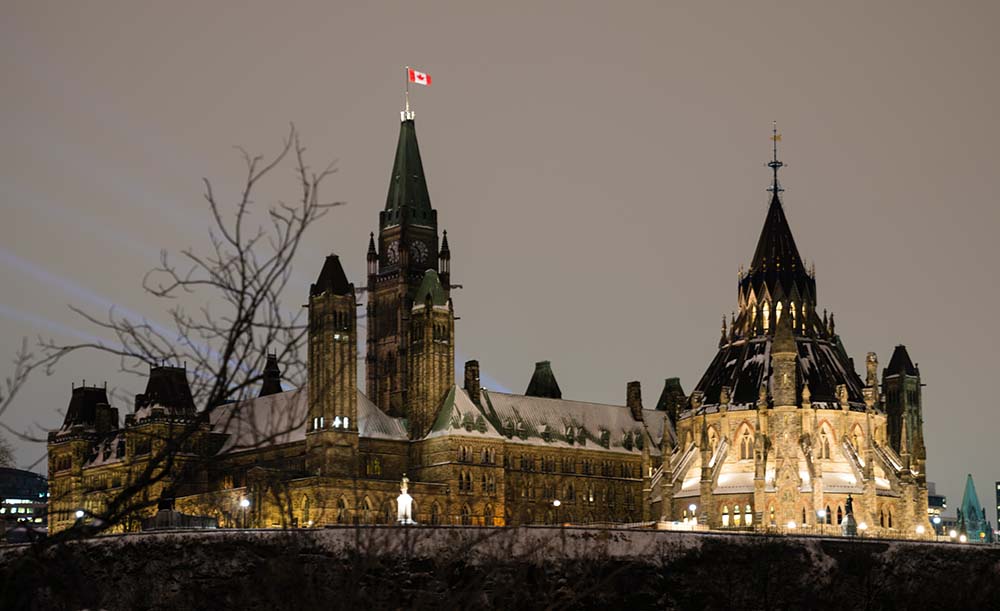For the past 90 years, Canadian politics has been influenced by the presence of a genuinely left-wing political party. The Co-operative Commonwealth Federation (CCF) emerged in 1933 demanding nationalization of essential industries, universal public pensions, health care, family allowances, unemployment insurance, and workmen’s compensation. Its Regina Manifesto boldly asserted, “No CCF Government will rest content until it has eradicated capitalism and put into operation the full programme of socialized planning which will lead to the establishment in Canada of the Co-operative Commonwealth.”
Despite achieving power in Saskatchewan in 1944 and then introducing Medicare, the party never came close to ruling at the federal level; even after a CCF alliance with big unions in 1961 produced the New Democratic Party (NDP), third-place standings were the usual order of the day.
This lack of electoral success does not mean that the left-wing group was without influence, as can be seen by the fact that many of its platforms are now widely accepted by other parties. Leaders have tended to treat compromise for the sake of votes with scorn and to be content with being a principled voice in the wilderness.
In 2011, the future looked bright for the NDP. In that year’s federal election, under winsome leader Jack Layton, the party had made a breakthrough in Quebec (hitherto an electoral wasteland) and elected 103 seats across the nation to become the Official Opposition. The death of Layton soon after left the party in the hands of Tom Mulcair, a fluently-bilingual Quebec lawyer seen as a moderate and a safe pair of hands. His qualifications, however, did the NDP no good because it encountered the charmed offensive of Canada’s current Prime Minister in the 2015 election. The NDP lost 59 seats and sank again to third place in the House of Commons. Accusing fingers were pointed at Mulcair who lost a leadership review and was forced to step aside.
The NDP held a vote for their new leader in 2017. The star quality of the candidates could not be said to be outstanding; the four front runners were worthy but dull: Charlie Angus, radical but little-known Niki Ashton, that guy from Quebec Guy Caron, and flashy but not an M.P. Jagmeet Singh. The race was complicated by rules which mandated that candidates required at least 500 signatures from party members, at least half of which must be from female-identified members and at least 100 from “other equity-seeking groups” including Indigenous people, LGBT people, persons with disabilities, and visible minorities. Singh won on the first ballot and NDPers dislocated their shoulders patting themselves on the back for choosing the first visible-minority leader of a Canadian federal party.
Glorious words were spoken about Singh’s chances in the coming election. He had won a seat in the House of Commons through a by-election victory in Burnaby, far from his Scarborough roots. His suits were impeccably-tailored, his watch was a Rolex, he rode designer bicycles, and drove a BMW; like Trudeau the Elder, Singh practised martial arts. His image could not have been any farther from the Founding Fathers of Canadian socialism, Tommy Douglas and J. S. Woodsworth. Toronto Life magazine prophesied that he had the makings of a “political superstar” who would make Trudeau the Younger jealous.
Sadly for NDP dreamers, the reality of Singh’s leadership has been disappointing. His abrupt dismissal of a Saskatchewan M.P. sparked a backlash in that province, formerly the heartland of the CCF. During the 2019 election campaign, his handling of the turban question was gracious but undoubtedly cost him votes in Quebec; conflicting messages about what the party would do in the case of a minority government won it no friends; worst of all, Singh’s ties to Sikh militancy in India, what the Globe and Mail called the “ethno-nationalist politics of another country and another time and place” led many to wonder where his true loyalties lay. 
When the smoke cleared on election night, the wreckage of the national NDP must have been dismaying for its supporters: it had lost a half-million votes and 20 seats. It was shut out in Toronto and retained only a single M.P. in Quebec; it was now a fourth-place party. Tom Mulcair might have been forgiven, a fleeting moment of Schadenfreude.
Since that election the NDP can have few doubts that the future of the party is an uncertain one. They have been outflanked on the left by both the Greens and the Liberals. Its links to agrarian socialism and the votes of working-class Ontario are now gossamer; it has no hope in secular Quebec as long as its leader wears a turban and the party opposes a ban on the niqab and other religious face covering. The only media attention Singh has won lately has been his petulant outburst against a Bloc M.P. which resulted in his temporary expulsion from the House.
This prompts two questions: Just who does the NDP speak for if it is no longer the sole progressive voice? And, will it dare to move closer to the centre and pose as the responsible left-wing vote in the face of a Liberal party bent on seeing if it can crack the trillion-dollar debt barrier?
If Singh is the problem, who is there on the meagre parliamentary bench to replace him? (One might look to bilingual House Leader Peter Julian or the sole Quebec M.P. Alexandre Boulerice as alternatives or perhaps, Winnipeg M.P. Leah Gazan for that much sought-after Chinese-Jewish-Lakota demographic.)
Most pressing is this query: when the House resumes sitting will the NDP support a no-confidence motion and force an election that may well decide whether the party has any future in Canadian politics?
I bet the NDP won’t support the no-confidence motion.
Gerry Bowler is a Canadian historian and a senior fellow at the Frontier Centre for Public Policy.
Photo by Naveen Kumar on Unsplash.



